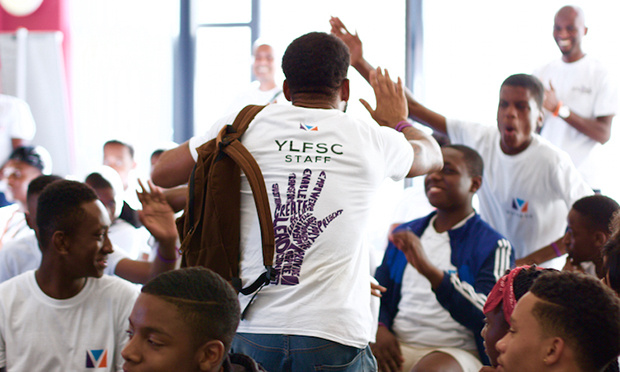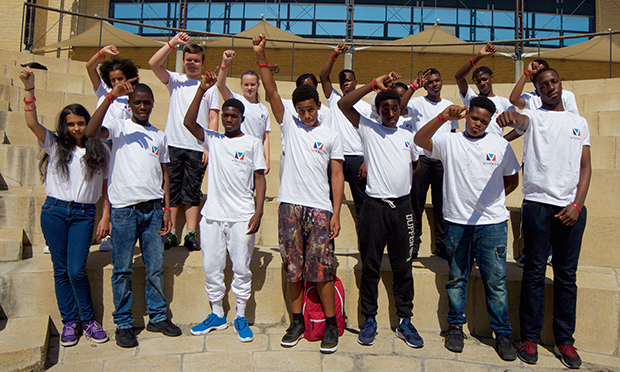Hackney youth charity on its new flower-giving project and the impact of Black Lives Matter

Hackney-based charity Voyage Youth has spoken to the Citizen about an innovative and dynamic new pilot project, Operation Smiles, that it is spearheading in collaboration with florist Arena Flowers.
During the conversation, Voyage Youth also discusses how the pandemic and the widespread surge in support for the Black Lives Matter movement has impacted on its work.
Operation Smiles will see young people across the borough distributing flowers to individuals and groups who have played an instrumental role in their lives as a means of thanking them.
The project will also feature a critical educational dimension as young people will have the opportunity to gain a greater insight into some of the most critical global challenges of our age, which continue to confound and divide political actors, academics and Non-Governmental Organisations alike.
Through Operation Smiles, young people will learn about environmentalism and sustainability, in addition to how they can play leadership roles in grassroots community activism addressing these issues.
Voyage Youth’s CEO, Paul Anderson said: “The project operates on many levels but is essentially an upcycling volunteering project designed to redistribute unsold flowers from Arena Flowers to individuals in need.”
The project will commence on Friday 10 July and flowers will be distributed over the following six weeks.
Paul continued: “We wish to focus Operation Smiles on those recovering from the symptoms of the pandemic, those who have lost loved ones, unsupported carers in the community as well our Windrush elders.”
He added that he particularly wanted the young volunteers to “bring joy and smiles” to those people who have played an important role in enriching their own lives.
Paul said there has been a considerable outpouring of enthusiasm for the project, and that the young people he works with have a keen interest in using their additional time constructively to engage in meaningful activities that positively impact their communities.
This is a sentiment which flies in the face of stereotypical media portrayals of disengaged, self-centred young people cocooned in a bubble of social media and frivolous gossip.
Voyage Youth is a social justice charity which specifically works towards promoting better outcomes for young black people experiencing marginalisation and disadvantage.
The charity runs a diverse range of activities designed to enhance educational attainment, emotional wellbeing and employment skills.
Its aim is to address social exclusion by instilling a sense of purpose, focus and resilience into each young person using the service.
In April, Voyage Youth, along with other charities, spoke to the Citizen about fears the coronavirus pandemic would intensify child criminal exploitation and that young people’s experiences would go unseen and unnoticed by wider society.
They warned that if the plights of affected children and young people were not placed high on the agenda by policy-makers, they would be rendered the invisible, hidden victims of the pandemic.
Though these conversations took place only a few short months ago, in some ways, as a society it feels we are universes away from where we were at the beginning of lockdown.
We have all seen how the pandemic has held an unflinching and uncompromising mirror up to British society.
The image conveyed back, of a society replete with a multitude of structural inequalities, has been impossible to ignore.
The murder of George Floyd in America, along with the disproportionality in the coranivirus death rate among people of colour, has sparked a nationwide discussion about what it means to be Black in modern Britain.
Over the past two months, we have witnessed iconography representing Britain’s imperial past being brought tumbling down and ejected from the public realm.
We have seen the beginnings of a national conversation over what and whose history is on the British school curriculum.
We have seen an innumerable amount of Black public figures speaking out and bearing witness to the racism they have experienced on the street, in the education system, in the workplace.

Although many different groups have fought for decades to raise awareness of these issues, it feels that this year we are at a critical juncture, with widespread public acknowledgement that racism is still a prevalent feature of our society.
There has also been a broad consensus that substantial action needs to be taken to confront and eradicate racism from our society.
Voyage Youth is a charity whose principle aim has been to try to address the challenges young Black people face in society – a long time before the global eye of the world was trained on racial inequality.
When asked whether he is hopeful about the ability of this cultural shift to affect material changes in the lives of the young Black people he works with and the new opportunities the movement might offer the charity, Paul shared that it has been very inspiring seeing the support for Black Lives Matter grow.
However, following up on the conversation in April, he was also quick to add that, working on the frontline, it is clear there are still many young people who remain at dire risk, physically and emotionally, due to child criminal exploitation.
He said that, prior to 2020, Voyage Youth had seen its funding dwindle, and he was becoming apprehensive about whether the charity would have the financial means to sustain longevity.
This concern, he added, was in part due to a lack of wider understanding about the charity’s central focus on young Black people and the specific challenges this demographic faces.
He said other charities working with the Black community had also experienced similar difficulties.
However, the Black Lives Matter movement has seen white and non-Black people of colour becoming more educated and informed about the systemic anti-Black racism faced by the African diaspora throughout the world.
This has led to a new appreciation and respect for the work of charities such as Voyage Youth.
Paul revealed that in the last two months, Voyage Youth has received a great deal of support and goodwill, and he said it is “very positive to see white people talking amongst themselves, assessing the role they can play” in combating discrimination and racism.
The funding difficulties Voyage Youth faced speak to a larger problem within the charity sector of systemic racism, an issue that went viral on social media last year.
After the release of training materials by Citizens Advice, which portrayed people of colour in deeply problematic terms, #CharitySoWhite was born.
The hashtag empowered many Black employees in the third sector to publicly share their experiences of implicit and explicit manifestations of racism.
Their testimonies detailed how entrenched racism in the third sector permeated every aspect of their working lives, from impacting on funding opportunities to staff being held back from progressing in their careers due to negative assumptions about their professional competencies made on the basis of their race.
Paul feels the renewed focus on the Black Lives Matter movement has encouraged a younger generation of Black teenagers to confront racism in their own lives.
He recounts the story of a young person he works with, who recently successfully challenged their school about a lack of representation, kick-starting a productive, open conversation about race between teaching staff and the student body.
This youth activism follows an inspiring tradition of young people in Hackney fighting against racism and discrimination.
Most recently the Citizen has followed the journey of Ruby Williams. After being sent home from school for the length of her hair, Ruby has been fighting for the right of Black students across the UK to wear their hair in its natural state.
Paul told the Citizen that he is particularly happy with the environmental focus of Operation Smiles, and he hopes this project will serve as a gateway for Voyage Youth to become more involved with green activism.
Climate change activism has made excellent headway in increasing public awareness of the seriousness and imminence of wholesale environmental breakdown.
Despite this, the environmental movement has also long been dogged by accusations of elitism and an over-emphasis on individual action in its strategies.
Critics have previously highlighted that some of the initiatives the movement has used, such as civil disobedience resulting in mass arrests of activists, fail to appreciate the specific barriers people of colour face in the criminal justice system which therefore has the potential to alienate them from green activism.
Climate change groups might counter this criticism by stressing that civil disobedience is just one form of activism that the press has sensationalised whilst neglecting to report on inclusive community work many also partake in.
Extinction Rebellion has also told its activists: “We don’t want or need everyone to get arrested – for some this is not a good idea.”
Paul believes Operation Smiles is a great opportunity to link more young BBlack people to sustainability and environmental discussions, where there may have historically been a deficit of their voices.
He believes that being well versed in critical social crises is essential for young people to be effective world citizens.
Ultimately, Paul hopes that in the coming years Voyage Youth will continue to forge partnerships with a diverse range of organisations, so the young people he works with can be exposed to a broad range of educational and employment opportunities.
It is clear that whatever the charity’s next steps, it will continue to be a powerful, dynamic force within the community.
For more information about the charity’s work, including Operation Smiles, head to voyageyouth.com
